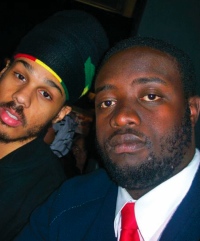Next: Biting into community service learning
Posted Jan. 12/08

Jarratt Best (left) and Bruce Kyereh-Addo (right) founded the student club Black Affinity to make a difference in the local and global community. To get involved, visit the recently launched website carleton.ca/blackaffinity.
Ravaged by civil wars, government corruption, disease and poverty, Africa is in crisis. The second-most populous continent, it is also the world’s poorest, despite its plentiful natural resources. Tackling the ailments of a continent characterized by diversity in language, styles of government, social values and religion means there isn’t one sweeping solution or easy resolution.
But where others feel overwhelmed, two Carleton students are inspired.
Bruce Kyereh-Addo and Jarratt Best are the founders and co-presidents of Black Affinity, a campus club launched in September. Designed to fight discrimination and racism on campus by uniting people, celebrating their diversity, and advocating for black interests, the club is also a means to effect change.
On campus, Black Affinity lobbies for the establishment of the Institute of African Studies and a corresponding degree program, voices equity issues faced by students, and lends its support to other programs, such as Equity Services’ Men of Depth Squad, a male peer-education program designed to prevent violence against women.
“We’re making a difference in Ottawa while we’re here,” says Kyereh-Addo, who is in fourth-year law. “But we also feel a responsibility to help Africa, and we feel we can make a difference from here.”
In pondering what needs to happen in Canada to effect change in Africa, the pair decided to launch an essay contest wherein students would discuss how to put ideas into action in four categories: uniting Africa, preventing and treating disease, the democratic process, and corruption of government. Judged by three faculty members and two graduate students in African Studies, the best paper will claim a $500 prize—and viable ideas from all papers will be used to compile “an instrument of action”.
“We hope that the papers’ authors will get involved in implementing the solutions,” says Best, who is in his second year of a combined philosophy and psychology degree. “Change starts with one voice, and grows stronger as others join.”
The club, which Kyereh-Addo describes as having “a big heart and small pocket”, hopes to send students to Africa in the future and will undertake fundraising activities to support the overseas projects.
Also in the planning stage is a research project focused on academics and employment opportunities for black youth in Ottawa. “The lowest segment of university enrolment is black men. What’s holding us back?” says Best. “What happens to young men after high school?”
By identifying the obstacles and attitudes that come into play, Best and Kyereh-Addo hope that skills-development and motivational programs in Ottawa can make a difference.
“We have a strong desire to help and education has given us a framework to work within,” says Kyereh-Addo. “It’s great to be able to apply classroom learning to helping the community.”